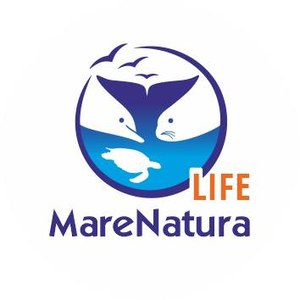LIFE MareNatura
The LIFE MareNatura project aims to mitigate threats affecting nine EU priority species: the Mediterranean monk seal, loggerhead turtle, green turtle, sperm whale, porpoise, Cuvier's beaked whale, common dolphin, shearwater minor and the Corsican gull.
So far, most conservation efforts have been aimed at the breeding areas of these species and thus their offshore habitats (feeding grounds, congregation sites and migratory corridors) have remained largely unexplored.
The objective of the LIFE MareNatura project is to significantly contribute to the conservation of these offshore habitats, through the identification of biodiversity hotspots in the Ionian, southern Adriatic and Aegean seas, strongholds of the populations of the target species, employing a massive effort of multidisciplinary investigation through innovative technologies and methods.
The LIFE MareNatura project, with a total budget of almost 11 million euros, is co-financed by the European Union (75%). It will cover a vast marine area from the Aegean to the Ionian Sea and the southern Adriatic, thus constituting the largest European marine biodiversity protection project ever carried out in Greece. A significant part of the program's actions will be implemented in 44 Natura 2000 protected areas (41 in Greece and 3 in Italy).
LIFE MareNatura started in July 2023 in Greece and Italy and is expected to be completed by June 2029. The final objective of the project is the effective protection of these species and, in general, the protection of marine biodiversity, proposing the declaration of new marine protected areas, which will expand the Natura 2000 network in Greece. In this way, the project will significantly contribute to the implementation of the new European Union strategy for biodiversity, which provides that at least 30% of Europe's seas and land must be protected by 2030, as well as the global strategy for biodiversity.
ISPRA is partner of the project

